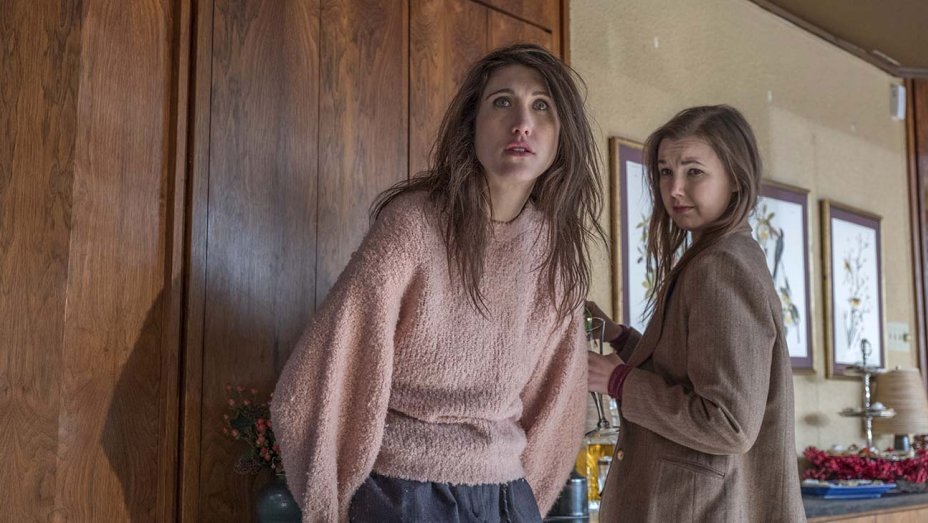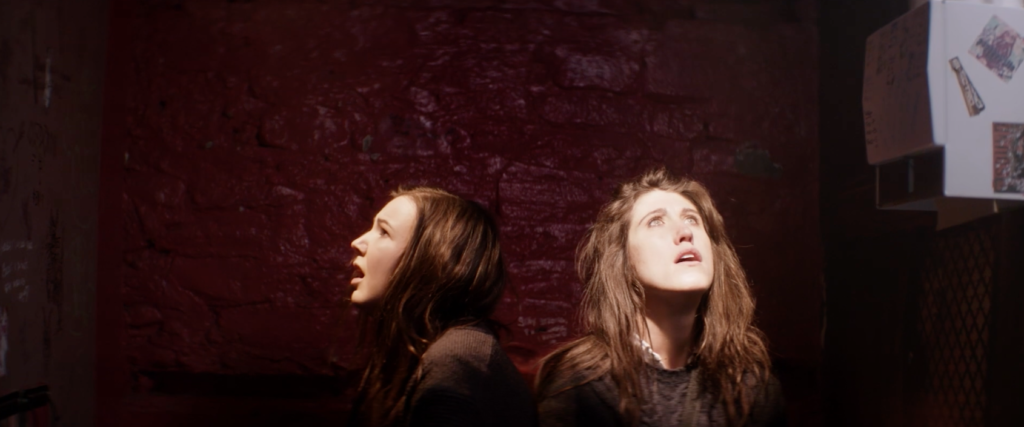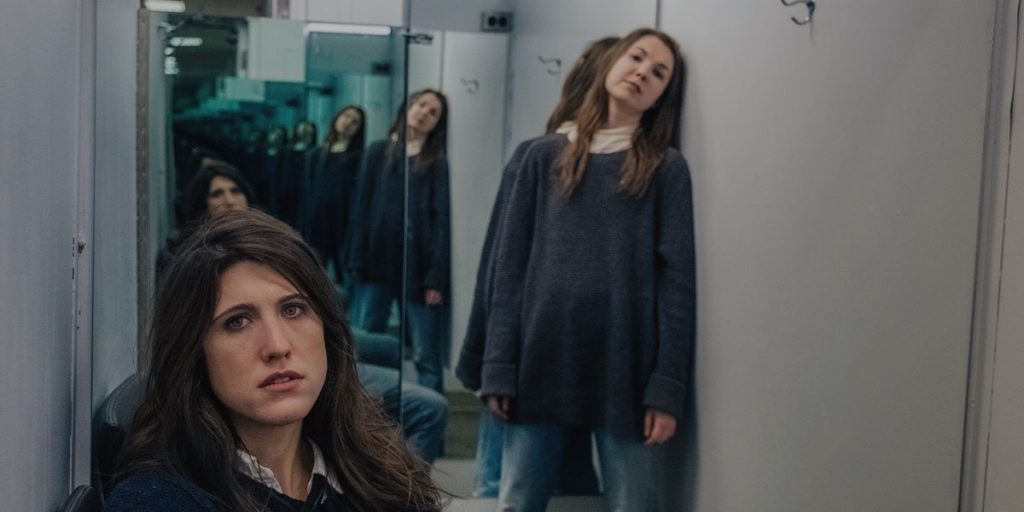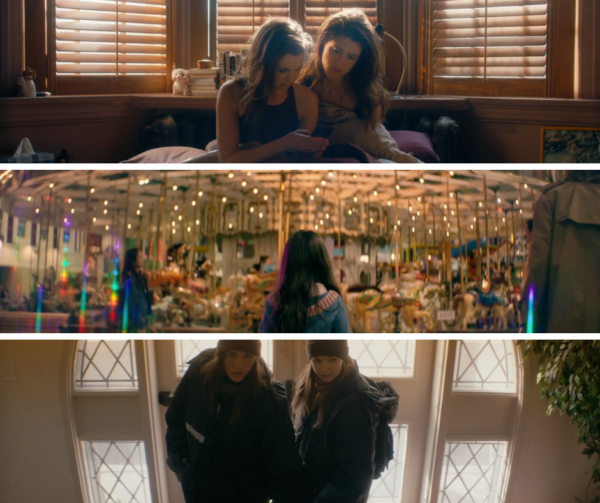“I love the theater experience. I love the darkness. I love the collectivity. I love hearing other people laugh or cry. I love that experience. I love the size of it. I love the sound of it.” Writer/director Patricia Rozema has been putting movies on the big screen since 1987, when her Canadian queer classic I’ve Heard the Mermaids Singing debuted at the Cannes Film Festival. Since then, Rozema’s worked steadily on both film and TV, racking up a filmography that includes 1999 Jane Austen adaptation Mansfield Park and the 2015 post-apocalyptic drama Into the Forest, starring Evan Rachel Wood and Ellen Page.
A personal, idiosyncratic filmmaker, Rozema “[goes] into filmmaking situations where I can follow my own life and loves and obsessions. I feel very destabilized by having too many voices and too much conversation. When the budget gets really big, you have to listen to more people. …That’s probably why I opted out of giant projects. I’ve had those opportunities, and I’ve turned them down. [It’s like] I’m trying to paint something, and then there are like three other people with their hands on the brush. You’re trying to do something delicate, and I don’t want to be embattled while I’m doing something delicate.”
Following a “formula,” Rozema explains, is not something she’s interested in doing—and it’s something she doesn’t do in her latest, Mouthpiece, opening today in Los Angeles. Like many a Sundance dramedy before it, the film follows a young woman wrestling with the death of a family member, in this case her mother. The difference here is that the woman, Cassie, is played by two people: Amy Nostbakken and Norah Sadava, who created the play on which Mouthpiece is loosely based and collaborated with Rozema on constructing its film adaptation. Far from being a gimmick, this dual-actor concept—Nostbakken and Sadava are together in every scene of the film, playing Cassie as one—allows Mouthpiece an incisive, piercing look into modern womanhood. Interacting with friends, family, strangers, and herself, Cassie struggles to unpack the duality of her own mother (Maev Beaty) in order to write a eulogy. Was she a strong woman or a “doormat” for sacrificing her own career goals for her family?
Mouthpiece is currently playing at the Laemmle Monica Film Center in Santa Monica, CA. Below is an edited transcript of her conversation with Boxoffice, edited for length and clarity.
Mid-range films, especially those without A-List stars or that aren’t based on existing IP, increasingly debut on streaming platforms instead of getting a theatrical release. Why was it important for you that Mouthpiece play in theaters?
I almost feel like this is one of the last small, human dramas that still plays on a big screen! That’s a rarity now, unless it has giant stars in it. I don’t have giant stars. All three leads had never been on a film set before. There’s a couple of reasons [the big screen was important]. One is just the pleasure in that experience for me. I like to recreate that pleasure for others. The second is a pragmatic one. You get certain kinds of reviews when you have a theatrical release that you don’t necessarily get if it’s Netflix or Hulu or whatever.
Netflix has so much content that they just dump.
And it gets lost in the bin. If you don’t have names, how could you sell [Mouthpiece]? It only would be reviews that would do it. And I would only get the reviews if I had a theatrical release.
[The publicist] mentioned to me that it’s mostly male critics giving Mouthpiece negative reviews.
Is that true?
She said that. I trust her on that.
Interesting. Women have liked it. Some men have loved it. But I guess it’s true that the ones that haven’t liked it have mostly been [men].
Why do you think that is?
It’s harder for them. They’ve been raised from early on to only be able to slip inside of a character who’s male. They haven’t had to have the expansiveness or the empathic abilities to slip into a female character. Female characters have been not ones that they necessarily identify with, unless they’re killers.
Unless they’re sexy killers.
Sexy killers. Very large-breasted, sexy killers. Then a big movie can be made about them, and they can have a complicated joy in it. It has been the case, always, that what succeeds most on the big screen are the big stories, the myths of our time. It has also been the case that high conflict is an easy draw. High concept, high drama. Just high. High movies. Then you get the big release. But this is a high concept movie! Two people playing one. You could see a big Hollywood comedy having this concept. You could play it for jokes.
You could see it as a crime thriller—“Which one committed the murder?”
But it’s not that. I don’t even know what it is I make. I really don’t. I make these things, and I sometimes think: “I think people will like it. I don’t really know.” I know that I make it until I feel something or it makes me laugh. With this, I felt both those things. And it’s new. I hadn’t seen it before.
Speaking of things that make you laugh—one of my favorite scenes in Mouthpiece is the scene where the two Cassies are talking to each other during sex. It highlights that sex is ridiculous, first off. But it also taps into one of the film’s throughlines, of women constantly navigating societal expectations through their internal dialogue.
It’s so tragic, even while it’s funny. In you most unguarded, most naked moment, you’re still critiquing yourself. You’re still saying, ‘Oh, this isn’t a good angle.”
“Am I being too loud? Am I being not loud enough?”
“Is that a natural sound?” And also the male frontal nudity—you don’t see that very often. I wanted that to be as a matter-of-fact and nonchalant as female [nudity] is. Why not? Yet somehow it still comes out as surprising to people.
My reaction was a little bit: “Oh!”
“Oh! That’s what I think it is.”
There’s no reason that it shouldn’t be there. It’s a sex scene. But it’s still a little shocking.
Because it’s so rare. Male actors generally don’t want to be vulnerable in that way, and women have been encouraged to feel vulnerable. I think that’s it. And [chuckling] they don’t want to be measured up against others.

I was thinking about it in the context of the lesbian sex scene in When Night Is Falling. They’re very different, obviously, but they both feel like they have a female sensibility. The When Night is Falling scene is very focused on female pleasure, whereas oftentimes in male-female sex scenes there’s this more aggressive sensibility, like something is being imposed on the woman.
When that film came out, it got an NC-17 rating, and they said it was because of the heterosexual love scene. I very deliberately I lit them both the same way. I shot them both the same way. But I think they didn’t want to appear homophobic, so they had to criticize the heterosexual one! It was a very interesting thing. They were playing it really carefully. They were saying I had a certain number of thrusts I was allowed to show. Maybe I had spent a lot of time in France, where sexuality is much more frank and much more un-complicated. I have a very pro-sex brand of feminism that I relate to. Somehow I think feminism got confused with puritanism in North America a little bit. America even more than Canada.
A “protect the children” kind of thing?
No, not protect the children. I totally believe in [that]. I really think it’s important not to expose little children to explicit sexual imagery, because it’s just too compelling, and once your mind is set on that you can’t think about anything else. I think it’s very, very important to allow children to have as long of a childhood as possible before sexual imagery comes into play.
But I think that, for adult women, there’s this idea that if there’s nudity, it must mean that you’re a servant to men. I don’t think that’s the case. I think it’s been the case that men have controlled the cinema. So, yes, as a result, female nudity has been at their pleasure.
It’s been inherently sexualized.
Exactly! But inherently male dominated. So women, if they’re naked in film, they’re being dominated by men. But nudity itself doesn’t carry any domination inherently.
Feminism has certainly evolved over the years. With Mouthpiece, you collaborated very closely with Amy and Norah—did the generational difference there bring anything to the project?
I don’t know. I just felt like they were comrades. I think they would say the same thing. We’re similar, forward-thinking women. They’re heterosexual, so they have this complicating factor of wanting and needing the approval of men and needing the intimacy with them that I don’t care about. I like it, but I don’t need it in the same way. I called myself Jane Goodall. I would look at them like and think, “Oh, that’s how it is to be young and heterosexual these days.”
But mostly it’s overlap. Because even myself, I’ve internalized all kinds of misogyny that I’m only unpacking now. [In my early days as a filmmaker], I had a list of ten male filmmakers who were the people that I wanted to emulate, learn from, be like. I had written them down, and it never crossed my mind that they were all men. And then I saw The Piano by Jane Campion, and I saw Marleen Gorris and Agnès Varda—and I felt this gender allegiance
But there was a lot of overlap in [my] sensibilities [with Norah and Amy], for sure. I feel like there’s a little bit more ferocity in their feminism than there might be in mine, because it’s fueled a bit by need. Because I don’t need the approval of men in my life. It’s easier to be their friends. It’s easier to just accept their sexism, because it doesn’t affect my intimate life in the same way. I find that straight women are often more hostile to men than lesbians. For me it’s like, “Yeah, you know, they do that… Thank God I don’t have to deal with them!”

Women wrestling with their desire for approval from men, whether professional or personal, is something that comes up elsewhere in your work. Has wrestling with this topic through your art maybe helped you work through some of it in your own life? Is it a therapeutic kind of thing?
Well, all artist is therapeutic. I believe that we wrestle with the things that we can’t find words for in art. I certainly do. And quite often it’s a critic who’ll write something, positive or negative, and I go, “Oh, that’s what I was doing.” I feel that if I can encapsulate [a movie] in a catchphrase—which you’re so encouraged to do when you’re raising money for it—then I shouldn’t be making it, because then it doesn’t have enough complication or internal vibration anymore.
Have I worked through my own internalized misogyny through my work? I guess I have. My father believes that women were smarter than men. His mother was smarter than his father. She ran a farm in Northern Holland. I was [my father’s] favorite. My brothers will say it. I have two brothers, and I grew up thinking I could do whatever I want. Which was just completely out of character of that whole environment that I grew up in. Dutch Calvinist! Calvin College is where I went. Paul Schrader went there—we have exactly the same background. Betsy DeVos was in my dorm!
This is the world that I came from. You don’t get compliments in that world. To come out of there, a lesbian filmmaker, I was armored. I was armed. I had the wherewithal to keep working without any approval whatsoever. And then to be in Canada! “Film? Filmmaker? What’s that? Oh, oh, oh God!” Two were allowed: Atom Egoyan and David Cronenberg.
I had a fixation on making these things that I didn’t know if anyone would see, but I just took so much pleasure in the making of them and I came from such an archaic, isolated world and worldview that I just kept going.
Can you teach me how to not care what other people think? That sounds nice.
It’s the key force to everything. It really is. You’ll die anyway. At the end of the day, it’s only you. The film is the thing. I say this on set all the time: “Our bones will be dust, people. Our bones will be dust and this is still gonna be here.” Every time you make something, you have the chance to make it perfect. You have a chance to make excellence. No one cares what the making-of looks like. No one cares what you look like while you made it. No one cares how attractive or unattractive you are. No one cares. It’s just the thing itself is, so focus on that. It’s a series of shots in a row. Those shots have to add up to something above itself somehow.
The other thing I do is I assume I’m laughable. I assume I’m a risible figure, and so you can’t take me down. If I fall and do something very, very embarrassing, I laugh. Because I’m essentially risible, as a human, so who cares?

You’re loosely adapting a play here. And those, when turned into movies, sometimes can get quite claustrophobic.
Yes. But [the original play is] so abstract and so limited that I was never worried about that. People, funders and stuff, were worried, saying “It’s going to feel theatrical. It’s such a stagey idea, two people playing one.”
And your work always looks cinematic.
Thank you for saying that. Because I did want to say, ‘Have you looked at anything I’ve done? It’s never been not cinematic.” I thill so much in the image. That’s like a huge part of my attraction to the medium. So you don’t have to worry about that. I will always make it interesting to look at. It was a flyer, though. It was a risk, which was thrilling to me. “I’m just going to put two people in one bathtub, and [the audience is going to think] think they’re lovers, and then sisters, and then they’re going to twig when the brother comes in and [the two actresses switch dialogue back and forth during the conversation]. And then I think they’re going to get used to it. I think it’s going to become organic.” But I couldn’t be sure whether it would distract from the emotions. That was what I didn’t want to do.
I like that, while you have a duality with the two actresses playing Cassie, it’s not like one is the “buttoned-up” one and the other is the “wild” one.
A lot of people like that. But I can’t tell you how many people wanted us to do that. They wanted the good and the bad.
Mouthpiece really made me think about my grandmother. She could have been an amazing journalist if she’d been born just a little bit later.
That’s the grief of it of it. A whole half of the human population have been nurses and maids for the other half. [Mouthpiece] is partly dedicated to my mom. She was in a family with two boys and six girls, and the boys got to go to have higher education but not the girls. And it always infuriated me. She was really smart. She and my father started this business, and then it took off and they did a great job with that. When she was 53, she went back to school because she always wanted to get a higher education. And just as she was getting out and starting to use it, she got diagnosed with cancer and died. She’d had this yearning her whole life. I didn’t even realize that until after. I thought, “Oh, this is for mom.” I didn’t even—How stupid am I? That I didn’t get that.
In the film, Cassie feels resentment towards her mother for all the thing she didn’t achieve in life. Is that something that bubbled up in your psyche, as well?
Oh, no. No, no, no. That’s not me. No, the girls had that more. The girls, also known as full grown women! Amy and Norah. That I think that was a bit more from them.
That fits in with what you said earlier, about their approach being a bit more in-your-face.
Yeah. It’s in your face, and it’s a little bit angrier towards the patriarchy than I am. I see it as an evolution, and we’re coming out of it. Unless, you know—Trump is setting us back. Civilization’s regressing. I don’t even think the backlash [against women] has started.
They say the long arc of progress tends towards the good. Even if that’s true, how many women have to die before it happens?
There are centuries that lean towards greater freedom of expression for a greater number, and then there are essentially others that squelch people. I think we’ve had a good, long run of peace and prosperity and progress for women and everyone that’s not a straight white male. But I don’t know how long it’s going to last. I tend to be positive. I knew I was ahead of the game with my whole gay thing and female thing. I knew that Hollywood would never like me. I didn’t think that I could command big budgets. But I also knew that the cat was out of the bag that homos are people, too, and that women deserve and will have a voice. I sort of just always knew that that was coming.
The industry would catch up.
They’d catch up. It sounds arrogant to say in my head, but I did. I lived in this small little progressive pocket called Canada where there was money—small amounts, but there was money for more adventurous work. I’d rather keep working. I went to Hollywood I met hundreds of people who were always in development and never got to make a movie. And if they did, there were so many people fighting over it that was like it had no personality whatsoever. [I went to a place that was] was more accepting of the likes of me.



Share this post